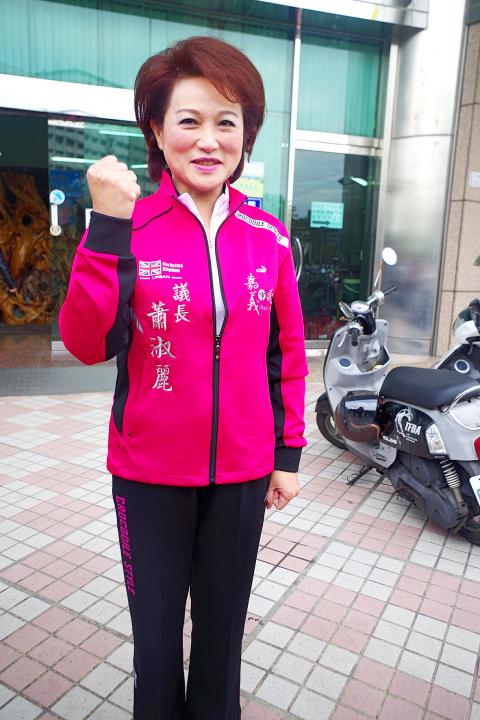Chinese Nationalist Party (KMT) Chiayi City Council Speaker Hsiao Shu-li (蕭淑麗) yesterday announced that she would run as an independent for the Chiayi mayoral post later this year, saying she did not trust the KMT’s poll-based primary.
Hsiao said she forsook her supporters three years ago by not completing her bid for mayor and did not want to let history repeat itself.
“I hope my bid will not be determined by the party, but by public opinion,” Hsiao told a news conference in Chiayi, adding that a political party should be like-minded people jointly fighting for people’s happiness and best interests.

Photo: Taipei Times
In March 2014, eight months before the local nine-in-one elections, Hsiao also said she would withdraw from the KMT and run as an independent candidate.
She dropped out of the race in July that year.
Hsiao rejoined the KMT in late 2014 after winning a city councilor seat as an independent.
Twu Shiing-jer (涂醒哲), the Democratic Progressive Party candidate, won the mayoral post, defeating the KMT candidate, former National Youth Commission minister Chen Yi-chen (陳以真), by only 8,590 votes.
Hsiao said she started mulling quitting the party again after former Chiayi mayor Huang Min-hui (黃敏惠) announced her bid for the mayoral post at an event also attended by KMT Chairman Wu Den-yih (吳敦義) on Saturday last week.
“Such a coincidence has caused grievance among my supporters,” Hsiao said.
KMT Culture and Communications Committee deputy director-general Hung Meng-kai (洪孟楷) said the party still hoped that all aspiring candidates could return to the party’s primary mechanism.
Asked whether Hsiao notified party headquarters before her announcement, Hung did not answer directly, but said only that the KMT has a good grasp of the situation.
At press time last night, the KMT’s local branch had yet to receive Hsiao’s application for membership withdrawal.

Nipah virus infection is to be officially listed as a category 5 notifiable infectious disease in Taiwan in March, while clinical treatment guidelines are being formulated, the Centers for Disease Control (CDC) said yesterday. With Nipah infections being reported in other countries and considering its relatively high fatality rate, the centers on Jan. 16 announced that it would be listed as a notifiable infectious disease to bolster the nation’s systematic early warning system and increase public awareness, the CDC said. Bangladesh reported four fatal cases last year in separate districts, with three linked to raw date palm sap consumption, CDC Epidemic Intelligence

Two Taiwanese prosecutors were questioned by Chinese security personnel at their hotel during a trip to China’s Henan Province this month, the Mainland Affairs Council (MAC) said yesterday. The officers had personal information on the prosecutors, including “when they were assigned to their posts, their work locations and job titles,” MAC Deputy Minister and spokesman Liang Wen-chieh (梁文傑) said. On top of asking about their agencies and positions, the officers also questioned the prosecutors about the Cross-Strait Joint Crime-Fighting and Judicial Mutual Assistance Agreement, a pact that serves as the framework for Taiwan-China cooperation on combating crime and providing judicial assistance, Liang

The manufacture of the remaining 28 M1A2T Abrams tanks Taiwan purchased from the US has recently been completed, and they are expected to be delivered within the next one to two months, a source said yesterday. The Ministry of National Defense is arranging cargo ships to transport the tanks to Taiwan as soon as possible, said the source, who is familiar with the matter. The estimated arrival time ranges from late this month to early next month, the source said. The 28 Abrams tanks make up the third and final batch of a total of 108 tanks, valued at about NT$40.5 billion

Reports of Taiwanese going missing, being detained or interrogated, or having their personal liberties restricted in China increased about fourfold annually last year, the Mainland Affairs Council (MAC) said yesterday. Last year, 221 Taiwanese who traveled to China were reported missing, were detained and interrogated, or otherwise had their personal freedom restricted, up from 55 the previous year, the council said. Reopening group tours to China would be risky, as it would leave travelers with no way to seek help through official channels after Beijing shut down dialogue between the associations tasked with handling cross-strait tourism, the MAC said. Taipei’s Taiwan Strait Tourism